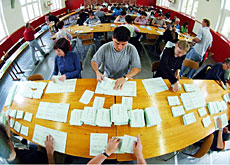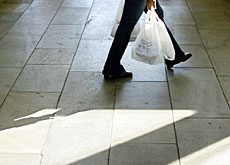Swiss decide on GMOs and Sunday trading

The Swiss have voted on introducing a five-year ban on genetically modified organisms (GMOs) in agriculture and on easing Sunday trading restrictions.
Latest polls suggested a double yes vote, with the moratorium being carried by only a narrow majority. First results are expected shortly.
The vote on the GMO moratorium comes after parliament passed a new law in 2003, which allows GM crops in Switzerland under certain conditions.
At the height of the debate environmentalists and consumer groups started collecting the necessary signatures to put pressure on politicians and let the electorate have the final say.
Supporters of the moratorium argue GMOs are neither in the interest of consumers nor of Swiss farmers, and that a GM-free agriculture is an opportunity for farmers to improve their marketing for natural production methods.
“It doesn’t make sense to grow products nobody wants,” said Hansjörg Walther of the leading Swiss Farmers Association.
Consumers and research
The lobby groups, supported by the Greens and the centre-left Social Democrats, say the proposal is not targeting research, but would give more time to consider the potential risks of GMOs.
The government, the business community as well as the main centre-right and rightwing parties have all come out against a temporary ban on GMOs.
They say the current law contains enough safety guarantees and a ban could be detrimental to biotechnology research in the country.
Spain and Romania are the only countries in Europe with sizeable acreages of GM plants, including soy and maize.
The European Union, of which Switzerland is not a member, lifted a moratorium on GM crops last year. But surveys in Switzerland and EU countries found that consumers have little interest in GM food.
According to the final survey by the Bern-based gfs institute ten days before the vote, support for a moratorium was slightly up at 48 per cent. The previous poll in October found a 47-per-cent approval rating.
Some 36 per cent of respondents were against the moratorium.
The electorate overwhelmingly voted down a far-reaching ban on GMOs in 1998.
Unions and church
In a separate vote, the Swiss are deciding on an amended labour law, which eases restrictions on Sunday trading at the country’s main railway stations and airports.
The trade unions, supported by the centre-left Social Democrats and the country’s main churches, have mounted a challenge to the revised legislation. They are concerned that relaxed regulations will lead to a seven-day working week.
“We have to prevent Sunday work from snowballing,” said Paul Rechsteiner, president of the leading Federation of Trade Unions.
Both the Protestant and Catholic churches have sided with the unions, warning that Sunday risks losing its special status in society.
The government, three of the main centre-right and rightwing parties, as well as the business community have come out in favour of more relaxed rules.
They say shopping at the country’s main public transport hubs meets a need among a growing number of consumers and is in line with the latest commercial trends.
Shops in Switzerland usually remain closed on Sundays and public holidays, but numerous exceptions have been introduced, mainly in tourists areas, service stations and at airports and railway stations.
In 1996 Swiss voters overwhelmingly rejected proposals aimed at easing restrictions on Sunday work.
According to the gfs poll, supporters of relaxed regulations are still in the majority.
But the level of opposition to Sunday trading had risen seven percentage points from 33 per cent in October to 40 per cent just ahead of the vote.
swissinfo
Under a 2003 law, the Swiss parliament approved the use of GM crops under strict conditions.
Surveys have shown that consumers have little interest in GM products.
Sunday work in Switzerland is banned in Switzerland in principle under 19th century labour legislation.
Shop opening hours are decided at a regional and local level and the authorities have eased Sunday trading restrictions over the past decades.

In compliance with the JTI standards
More: SWI swissinfo.ch certified by the Journalism Trust Initiative











You can find an overview of ongoing debates with our journalists here . Please join us!
If you want to start a conversation about a topic raised in this article or want to report factual errors, email us at english@swissinfo.ch.